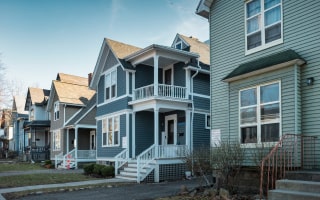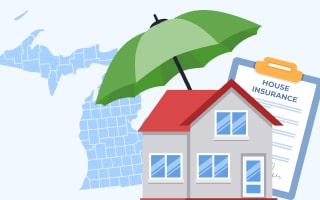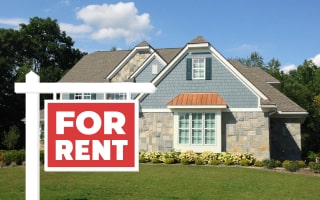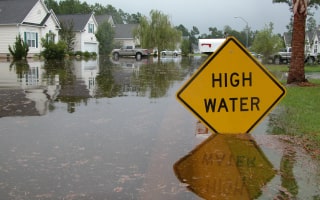Homeowners Insurance in Michigan

Known for being the automobile capital of the world in the early 2000s, Michigan is also home to Motown Records. Situated in the Midwest, Michigan is prone to tornadoes, earthquakes, and wildfires and is considered a high-moderate risk state by homeowners insurance providers. Historically, Michigan has proven to be a relatively safe state with fewer disasters and claims. Since 1958, Michigan has had only 37 federally declared natural disasters, and the rate of disasters per 1 million people has been low, at 3.68.
Michigan's most frequent home insurance claims are wind, hail, fire, and lightning. Wind and hail make up about 75% of all Michigan claims. Twenty-five percent of claims are due to water damage, theft, and other types of property damage.
No state requires any homeowners insurance, but they all insist that everyone who owns property in Michigan, should have at least some coverage. However, if you borrow money to buy your home in Michigan, your lender will require you to purchase home insurance and keep specific coverage amounts active until you pay the loan off.
Michigan homeowners pay an average of $1,835 a year for $200,000 of dwelling coverage, which is less than the national average of $2,511 per year or $209 a month.
Types of Homeowner Insurance Coverage Available in Michigan
Depending on where you live, you may have access to certain types of homeowners insurance. Within each state, certain insurance providers offer types of coverage that fit the expected perils. In Michigan, you can find the following types of coverage:
-
Dwelling Coverage: Dwelling coverage will replace or repair the structure of your home after a qualifying event, such as a fire or windstorm. It protects your roof, walls, and other structural elements.
-
Liability Coverage: If someone is injured on your property due to your own negligence and they sue you, liability coverage will pay your legal bills.
-
Personal Property Coverage: Personal property replaces your belongings if destroyed or stolen.
-
Guest Medical Coverage: If someone gets hurt on your property, this coverage will pay their medical bills.
-
Other Structures Coverage: Other structures coverage replaces detached items like sheds, garages, pools, and fences.
-
Additional Living Expenses (ALE) Coverage: ALE coverage pays for your expenses if you are forced to leave your home while it is rebuilt or repaired.
Michigan has an extensive coastline, meaning floods are also a concern. Consider a flood policy or special umbrella package to cover where other policies leave you vulnerable.
FEMA (Federal Emergency Management Agency) manages the National Flood Insurance Program (NFIP) through a network of 50 providers across the U.S.
Since most homeowners insurance does not cover floods, this supplemental coverage can repair damage and replace items after a flood. Depending on the options you choose, it can cover the building and/or your personal belongings. This program is available to homeowners, renters, and businesses. Learn more about the program on FEMA's website.
Home Insurance and Natural Disasters
Severe weather is wreaking havoc on the home insurance industry. Climate change is the most influential factor driving insurance rates today. The U.S. sees more natural disasters damaging property each year and causing insurance claims and losses. As a result, over the past five years, rates have increased by 34% and, in some places, 60%. From 2018 to 2023, Michigan home insurance rates have increased by 19.2%.
Despite its reputation as a relatively safe state, Michigan is prone to tornadoes, wildfires, earthquakes, and floods. Typical fire and lightning claims average $77,340 a piece. Water and damage claims cost insurers $11,650 per incident, and wind and hail cost $11,695 each.
From 2015 to 2019, insurance provider losses in Michigan totaled $1,383,606,200. In 2021, Michigan was one of the top states for lightning damage claims totaling $26,900,000. It also made the list for most dog bites, incurring $48,258 in losses. From 1980 to 2024, Michigan experienced 55 billion-dollar disasters. In 2023, 19 tornadoes killed two people, and in 2022, 376 wildfires destroyed 3,522 acres.
How Can I Save on Homeowner Insurance Premiums in Michigan?
Home insurance premiums are on the rise, making it essential to find ways to reduce those expenses. The best way is to understand what affects your home insurance costs and then make changes to lower your rates. The most impactful factors affecting home insurance rates are:
-
Location: Where you live matters more than any other factor. If you live in a city where crime is higher or a place with frequent natural disasters, your premiums will be higher than if you live in a safe place with mild weather.
-
Your Deductible: The higher your deductible, the lower your rates. The more risk you are willing to accept, the more your carrier will reduce your rates.
-
Home Size & Age: Older homes cost more to insure. The larger the house, the more your insurance rates will be because it will cost more to replace if destroyed by a covered peril.
-
Condition of the Home: Homes in disrepair cost more to insure than well-maintained homes.
-
Claims History: People who file frequent claims pay more for home insurance than those with a clean claim history.
-
Credit Score: People with high credit scores pay less than those with poor credit.
-
Coverage Levels: The more coverage you purchase, the higher your premiums will be.
-
Risks: If you have pets or attractive nuisances on your property, you will pay more for insurance.
-
Construction Costs: Construction materials and labor costs are ever-increasing, forcing insurance rates to rise.
Some ways to save on your home insurance premiums include:
- Fortify Your Home: In Michigan, where residents experience tornadoes, windstorms, and earthquakes, the best way to protect your house is to install a wind-resistant roof, shatterproof windows, hurricane shutters, and straps.
- Avoid Risks: Don't install fireplaces, pools, or other risky items that can considerably increase your rates.
- Improve Your Credit: Raise your credit score over time and ask your provider to re-evaluate your rates.
- Raise Your Deductible: Raise your deductible as much as possible to lower your insurance premiums.
- Shop Around for Rates: Shop around for the best rates and get multiple quotes before deciding.
- Bundle Policies: Bundle multiple policies to earn a discount from your insurance carrier.
- Ask for Discounts: Ask your insurance agent about discounts you qualify for.
Home Insurance Discounts in Michigan
Home insurance pays to restore or rebuild your home after a covered event like a fire. You choose how much coverage you need; your insurance provider will pay to replace what you lost after an incident. Most policies include dwelling coverage, personal property, liability, medical payments, other structures, and ALE insurance.
You can purchase home insurance in a few ways. You can call an 800 number for a firm you are familiar with or apply online through the company website. You can also use a local agent, who can be helpful as they can assist you in getting the right coverage for your situation and budget.
Some of the most common home insurance discounts offered by reputable firms include:
- Location-Based Discount: If you live in a safer location, your provider may discount your rates, expecting fewer claims.
- Non-smoker Discount: Non-smokers have less of a fire risk and earn lower rates.
- Retiree/Senior Discount: Most providers offer discounts for seniors or retired persons,
- New Home Discount: New homes cost less to insure, and homeowners will get discounts of up to 40% less when they purchase a new home.
- Fire-Safety Discount: You could earn lower rates by installing smoke alarms, sprinklers, and fire extinguishers.
- Security/Safety Discount: Install a home security system, and your provider could lower your rates for being proactive.
- Claims-Free Discount: Stay claims-free for as long as possible to keep your insurance premiums lower.
- Paperless/Autopay Discount: Your carrier could discount your policy if you sign up for auto payments or paperless statements.
- Multipolicy Discount: Bundling policies are another way to save on home insurance.
- Military Discount: Most reputable insurance firms give military personnel and veterans discounts on their insurance.
- Professional Discount: Some professions, such as teachers and firefighters, also earn discounts on home insurance.
Common Rates Offer by Homeowners Insurance Firms
New homes are much less expensive to insure than older homes. A new homeowner could save as much as 40% on their insurance rates. Even 5-year-old houses cost less to insure, as much as 26% less. The average rate for new home insurance in Michigan is $1,785, less than the national average of $1,915. However, your actual premiums will depend on many factors, like your credit score, age, location, the size and condition of your home, and other things.
Top 10 Home Insurance Firms in Michigan and Average New Home Savings
| Company | % savings |
|---|---|
| Nationwide | 76% |
| Amica | N/A |
| State Farm | 51% |
| Travelers | 63% |
| Allstate | 47% |
| USAA | 54% |
| Lemonade | N/A |
| Liberty Mutual | N/A |
| Chubb | N/A |
| The Hanover | N/A |
Home Insurance and Renovations in Michigan

Regardless of your style, renovations can transform your home into something new and beautiful, but they can also drastically affect your home insurance premiums. Some upgrades can actually lower your rates by eliminating risk. Others will increase your rates by adding risk or value. Sometimes, a home renovation will do both, causing a net zero effect.
![]() Home Renovations that Increase Rates
Home Renovations that Increase Rates
Some home renovations that increase your rates include:
- High-End Upgrades: Upgrading your tired old home with luxury appliances, granite countertops, and high-end light fixtures will add value to your home and increase your rates.
- Hot Tub or Trampoline: Hot tubs, pools, and trampolines are considered "attractive nuisances" that increase risk and increase your rates.
- Adding a Home Office: Working at home could help your work-life balance, but adding a home office will increase your coverage needs and home insurance expenses.
![]() Home Renovations that Decrease Rates
Home Renovations that Decrease Rates
Some home renovations that decrease your rates include:
- Plumbing/Electrical Upgrades: Old wiring can pose a fire risk, and defunct plumbing could leak, causing water damage. Being proactive and updating these items before they cause harm could save you money on your premiums.
- Home Security System: Installing a high-end security system with monitoring and alerts could also save you money on home insurance.
- Fire Safety: Adding smoke alarms, a sprinkler system, and fire extinguishers will reduce your risk of damage by fire and decrease your rates.
Upgrading your roof could increase or decrease your home insurance premiums, depending on the materials and costs.
Your home insurance policy does not pay to renovate your home or install upgrades, even though they may decrease your rates. The purpose of homeowners insurance is to repair or replace your home and belongings after a covered event. During renovations, if someone steals something or gets hurt, those things are covered by your policy.
Before any renovation, speak with your insurance agent to determine how the work will affect your coverage levels, limits, and rates. Your agent will help you decide about any changes you need to make. They may also do a walkthrough after the work to re-assess.
Michigan Renters' Insurance

Renters insurance is for people who rent homes rather than own them. This includes residents living in apartments, condos, and houses. A renters policy does not include any dwelling coverage for the home's structure. That must be covered under the owner's policy. The main purpose of renters insurance is to protect your personal property, protect you against lawsuits, pay medical bills for anyone who gets hurt on your property, and pay your expenses if you must leave while the building is repaired.
Renters insurance pays to replace things like:
-
Clothing
-
Furniture
-
Small Appliances
-
Sporting Equipment
-
Electronics
Your policy will have limits, and expensive items like jewelry, furs, and art may not be covered.
Insurers consider three main factors when pricing renters insurance, they are as follows:
-
Location: As with other types of insurance, location matters. If you live in a city with higher crime or frequent, damaging storms, you will pay more than in a safe, quiet area.
-
Coverage: The more coverage you buy, the higher your rates will be.
-
Number of Units: The more units in your building, the lower your rates will be.
Michigan's average renters insurance rate is $19.69 per month or $236.28 a year, above the national average of $14.27 a month. Rates will vary depending on if you live in the city or suburban areas.
Condo Insurance in Michigan

Unlike homeowners insurance, condo insurance has a different type of dwelling coverage. The condo association will have its own master policy, which will rebuild each building back to its original condition when it was first built. The problem is that owners typically upgrade and change things like kitchens, baths, flooring, appliances, and light fixtures. Condo insurance picks up where the master policy leaves off and restores the entire "interior" of the condo back to its most recent condition with all the upgrades. Condo insurance also includes personal property coverage, liability, medical payments, and loss of use.
Condo insurance includes "walls-in" dwelling coverage, whereas renters insurance has none. Another difference is that the liability coverage on condos only works if the person is injured inside the condo, not outside.
A typical condo insurance policy will cover the following perils: fire, smoke, windstorms, vandalism, and theft. Some things condo insurance will replace include:
- Furniture
- Appliances
- Interior Walls
- Flooring
- Light Fixtures
- Countertop
- Cabinets
- Wiring
- Plumbing
- Personal Belongings
The average Michigan condo owner pays roughly $651 per year, or $54 a month, with a $1,000 deductible, $60,000 in personal property coverage, and $300,000 in liability. Michigan residents pay only slightly more than the national average of $625 per year.
Some ways to save on condo insurance are:
- Bundle Your Policies
- Increase Your Deductible
- Ask for Discounts
- Improve Your Credit
- Install a Security System or Fire Safety Features
- Shop Around and Get Multiple Quotes
- Change Your Coverage
- Don't File Small Claims
- Sign up for Paperless Statements or Autopay
Michigan Home Insurance Market
Much of the country has been ravaged by wildfires, hurricanes, and other types of natural disasters. It's no wonder that homeowners insurance profits are dwindling, and many insurers experienced significant losses over the past ten years. Michigan was one of only ten states with more than $3 billion in losses. Continued claims and losses will result in providers pulling out of the state, limiting coverage, or canceling certain customers.
Although considered a safe state, Michigan has had too many lightning storms, tornadoes, and wildfires, causing enormous damage and claims resulting in huge losses. If this trend continues, Michigan residents will find it challenging to find coverage.
Regulation of the home insurance industry is left to each individual state. These agencies monitor providers and evaluate rates. They also take customer complaints, investigate, and sanction guilty firms. They aim to ensure customers are treated equally, fairly, and ethically. In Michigan, that office is the Michigan Department of Insurance and Financial Services, located at 611 West Ottawa Street, 3rd Floor, P.O. Box 30220.
Homeowners Insurance Guide
- Homeowners Insurance in Michigan
- Types of Homeowner Insurance Coverage Available in Michigan
- Home Insurance and Natural Disasters
- How Can I Save on Homeowner Insurance Premiums in Michigan?
- Home Insurance Discounts in Michigan
- Home Insurance and Renovations in Michigan
- Michigan Renters' Insurance
- Condo Insurance in Michigan
- Michigan Home Insurance Market
Instant Access to Michigan Property Records
- Owner(s)
- Deed Records
- Loans & Liens
- Values
- Taxes
- Building Permits
- Purchase History
- Property Details
- And More!
Homeowners Insurance Guide
- Homeowners Insurance in Michigan
- Types of Homeowner Insurance Coverage Available in Michigan
- Home Insurance and Natural Disasters
- How Can I Save on Homeowner Insurance Premiums in Michigan?
- Home Insurance Discounts in Michigan
- Home Insurance and Renovations in Michigan
- Michigan Renters' Insurance
- Condo Insurance in Michigan
- Michigan Home Insurance Market